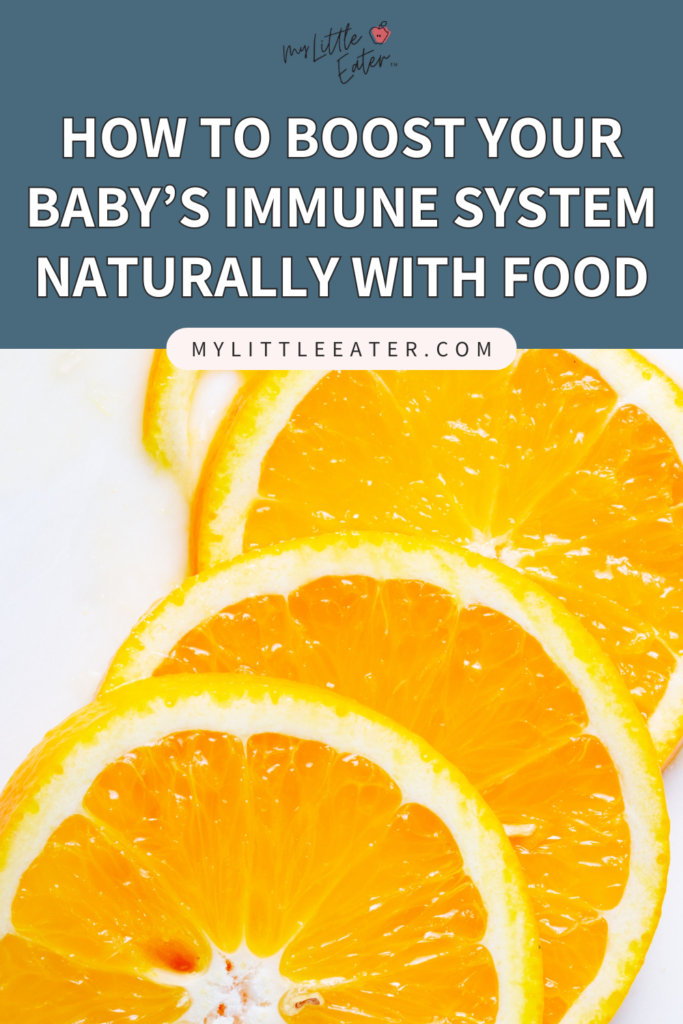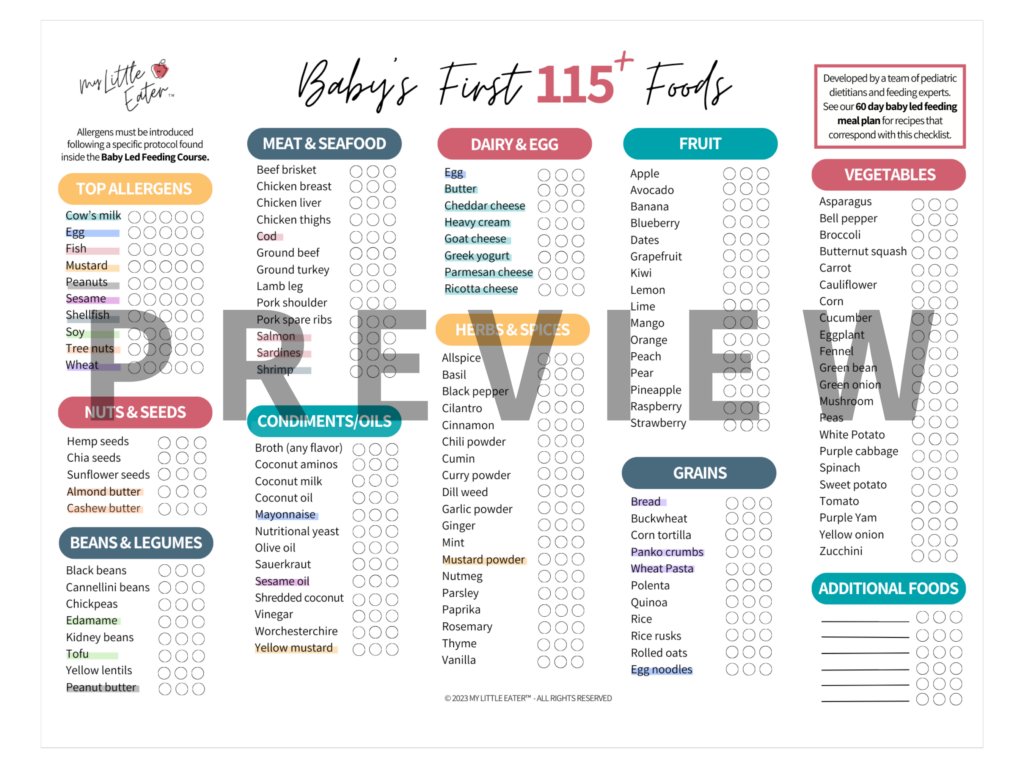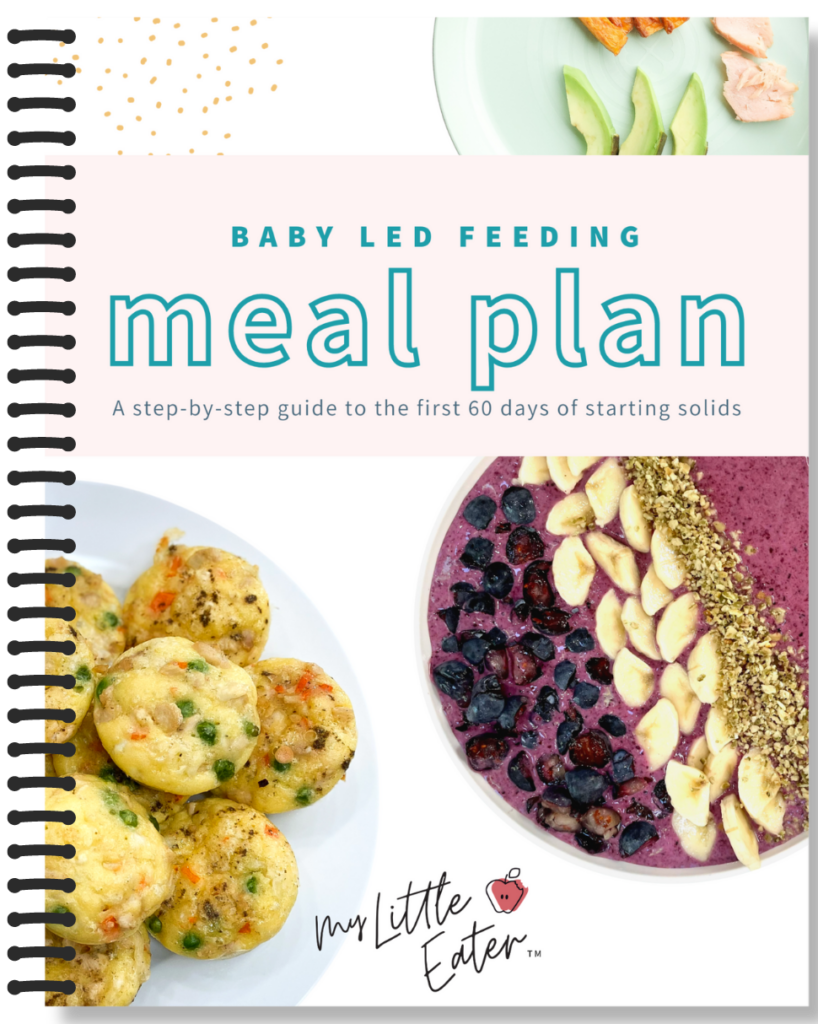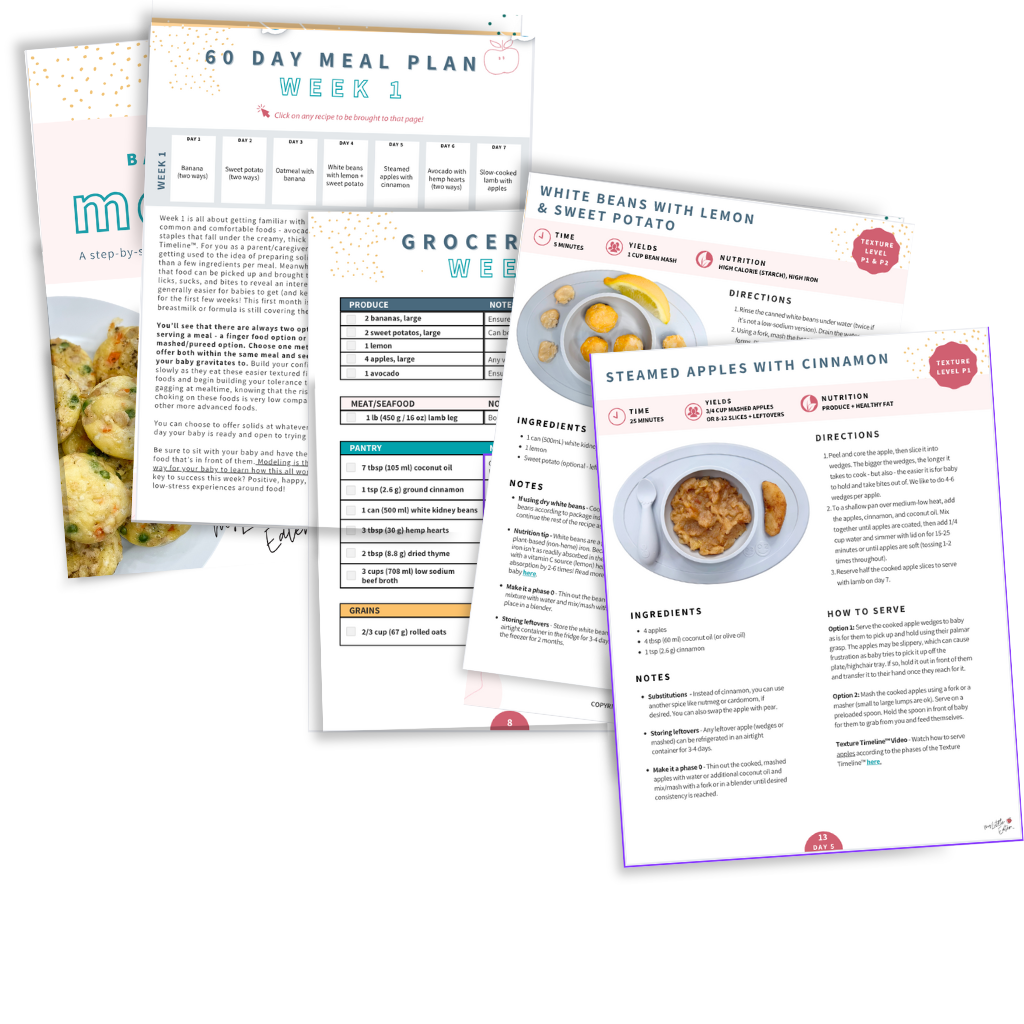This post may contain affiliate links, please view our disclosure policy for more details.
As parents, ensuring the health and well-being of our little ones is always a top priority. With their developing immune systems, it’s natural to want to do everything possible to boost their immunity and protect them from illnesses.
Plus, sick season with little ones is not for the faint of heart. Boosting their immune system can benefit the whole family!
That’s why we want to give you the research behind everything you can do to boost your baby’s immunity. From nutritional tips and supplements to simple lifestyle adjustments, we’ll provide you with the knowledge and support you need to help your baby thrive.
An excellent place to start is with our 60 Day Baby Led Feeding Meal Plan! Get healthy, nutritionally balanced meals that introduce top allergens (to reduce the risk of developing a food allergy) and gradually advance in textures using our Texture Timeline™.
It also comes with weekly grocery lists to make meal planning as simple as possible! You can start with purees or finger foods and modify meals to serve the whole family.
Take the stress out of choosing well-rounded, balanced meals for the next 2 months!
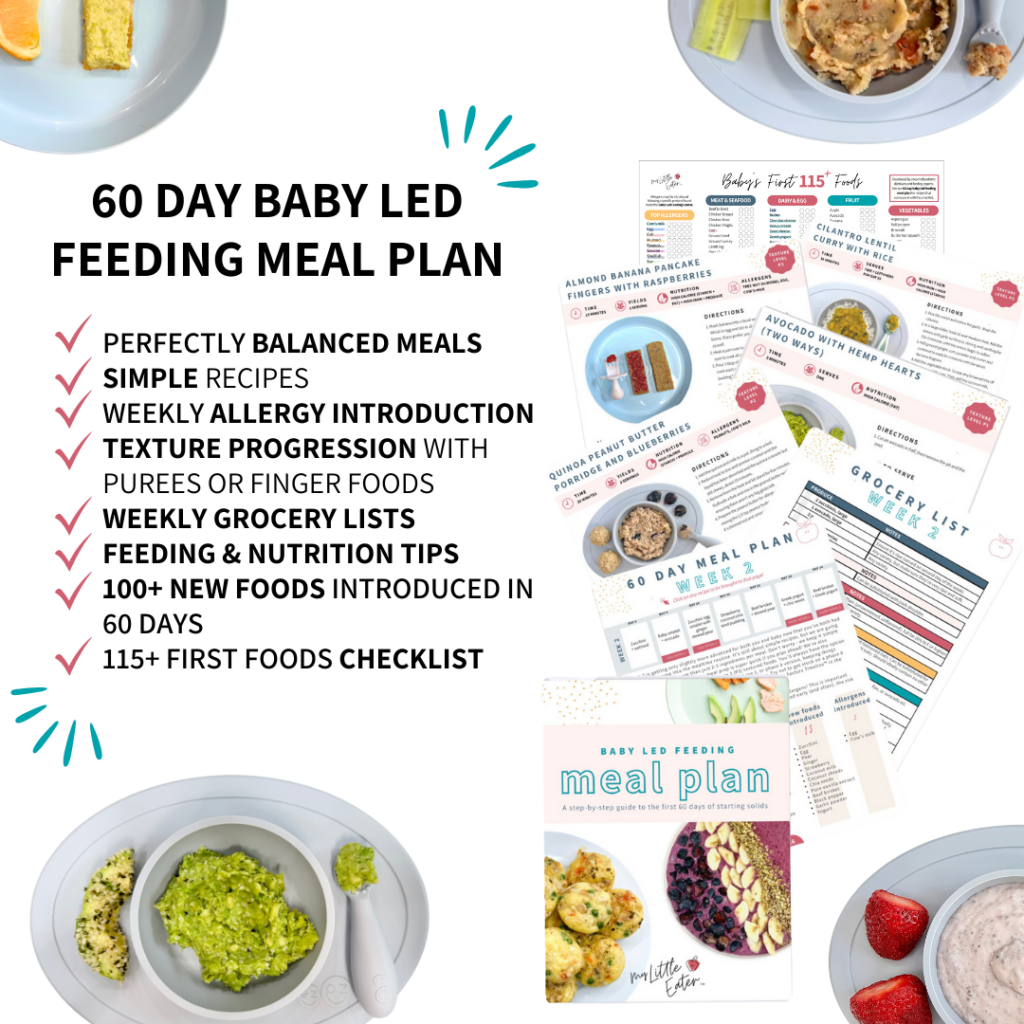
Table of Contents
Can you boost a baby’s immune system?
The simple answer is yes.
While your baby is born with some immunity passed on from you – their mama – there are ways you can continue to support their immune system as they grow.
By doing simple, yet beneficial tasks such as breastfeeding, providing a nutritious diet, practicing good hygiene, and following vaccination recommendations, you can help strengthen your baby’s immune response and protect them from common illnesses.

When does a child's immune system fully develop?
A baby’s immune system begins developing before birth and continues to mature over time. It’s generally not considered fully developed until later in childhood. This is typically around the age of 7- 8 years old (1).
However, it’s important to note that not every baby is the same, and some parts of their immune function may continue to develop even further into adolescence.
An example of this is with premature babies born before 37 weeks of pregnancy. Certain parts of the immune system, such as antibodies and white blood cells, develop in the later stages of pregnancy.
Additionally, during the last trimester of pregnancy, the mother passes antibodies to her baby through the placenta, providing passive immunity against infections. When a baby is born early, they miss out on this development.

This leaves premies more vulnerable to infections in the early weeks of life and contributes to why their immune system may take longer to mature compared to a full-term baby.
Supporting immunity with nutrition
There are certain things that you can do year-round that will help to ensure that your baby’s immune system can function as it should. Let’s go over those first before jumping into tips for providing that extra boost that’s needed during cold or flu season.
Breastfeeding
Breast milk is nature’s first vaccine, brimming with antibodies, immune-boosting cells, and nutrients tailored to your baby’s needs. The unique composition of breast milk provides essential protection against infections and diseases, laying a foundation for a strong immune system.

The CDC recommends that you continue to breastfeed until your baby is about 12 to 24 months (or for as long as it works for both of you) while providing nutritious meals and offering supplements when required (as approved by your baby’s doctor) (2).
However, we know that not everyone breastfeeds for various, valid reasons, and so we want to emphasize as well that the nutrients provided through infant formulas are also beneficial. When it comes to breast milk, we want to point out the additional factors, like antibodies. These can’t be replicated in infant formula, and they do provide an immune system boost.
Breast milk or formula is usually enough for babies under 6 months old as they still have some of mama’s immunity as well.
After 6 months, it becomes important to supplement your baby’s diet with more nutritious meals. This is because breast milk, despite its high nutritional value, lacks enough fat-soluble vitamins and nutrients to support the development of your baby from 6 months+. This would include vitamins A, D, and E – all of which are critical to immune function.
Offer varied and balanced meals
For babies who have started solids (typically around 6 months of age), this means ensuring each meal has a source of iron, a high-calorie food (high in healthy fat or starch), and some type of produce.
Once your baby enters toddlerhood at 12 months of age, you’ll want to follow our FFP+P Rule for balanced meals. This simply means that you offer a source of fiber, fat, protein, and produce at each meal (whenever possible).
Let’s get into the specifics!

Proteins
Incorporate protein sources into your baby’s diet, such as poultry, fish, tofu, and lentils. Protein is essential for the growth and repair of cells, including those involved in the immune response.
Additionally, glutamine, a substance in proteins, helps build up the defense cells that make up your baby’s immune system (3).
Healthy Fats
Include sources of healthy fats in your baby’s meals, such as avocados, nut butters, and olive oil. These fats contain omega-3 fatty acids and other essential nutrients that play a role in building up your baby’s immune function.
Whole milk, which is rich in healthy fats, can be offered as a beverage after 12 months of age or once you’ve stopped breastfeeding (if you choose to continue past that).
Fiber
Whole grains like oats, brown rice, quinoa, and whole wheat provide a steady source of energy and essential nutrients for your baby. In addition, fruits like apples and bananas, and vegetables like sweet potatoes and carrots are good sources of fiber for your little one.
These fiber-rich foods are also packed with vitamins and minerals which support overall health and contribute to a robust immune system.
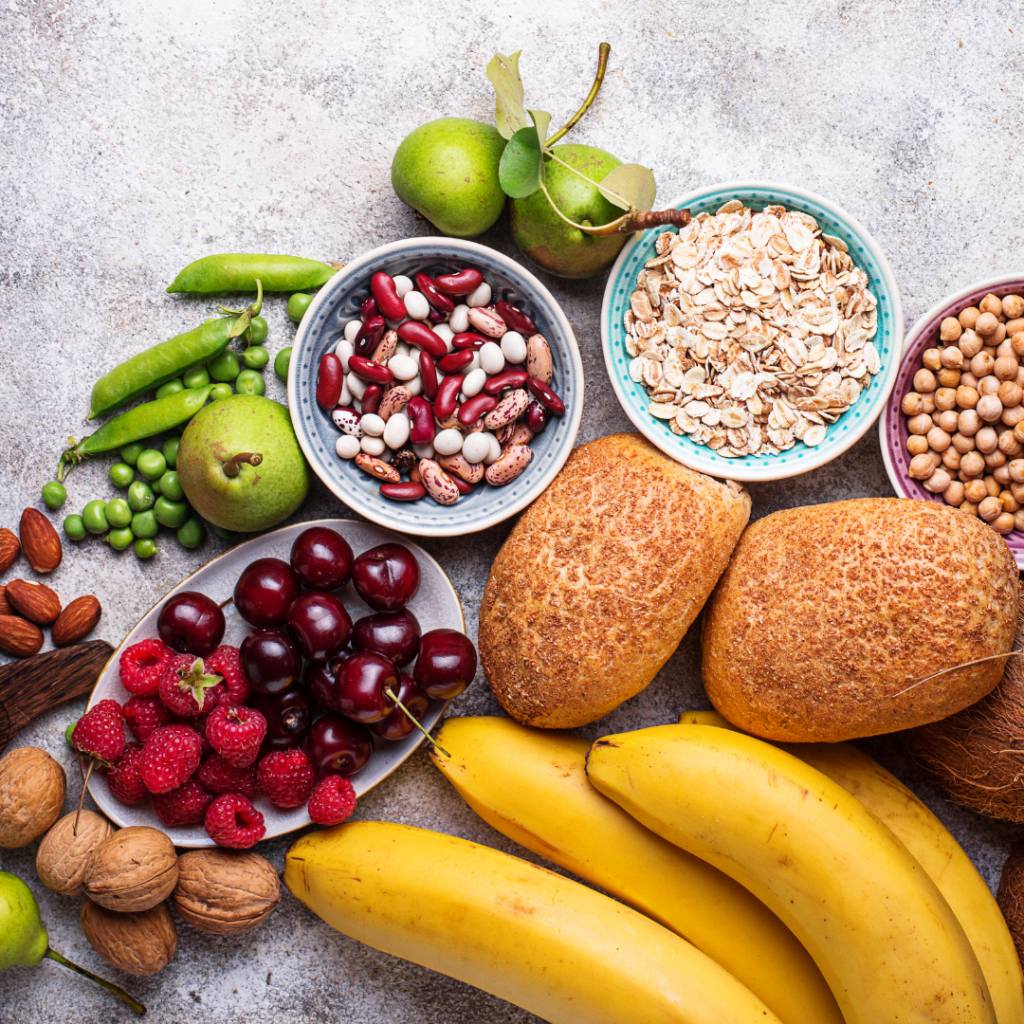
Colorful Produce
Be sure to introduce exciting options of fruits and vegetables into your baby’s meals regularly. Colorful fruits and vegetables are packed with vitamins, minerals, and antioxidants that help strengthen the immune system.
Offer a variety such as carrots, sweet potatoes, berries, and leafy greens to ensure your baby gets lots of nutrients while keeping the menu fresh and creative.
Specific vitamins and nutrients to include in a healthy diet
Other than offering a balanced diet with lots of variety, there are certain nutrients you can focus on that provide a larger impact on your baby’s immune system.
If you think your baby or toddler isn’t getting enough of the nutrients listed below, it may help to focus on including foods that are good sources of these nutrients to help build a healthy immune system year-round.
Probiotics
Introduce probiotic-rich foods into your baby’s diet such as yogurt, kefir, and fermented foods like sauerkraut and kimchi. These are all excellent sources of beneficial bacteria that can strengthen the immune system and promote your baby’s gut health.
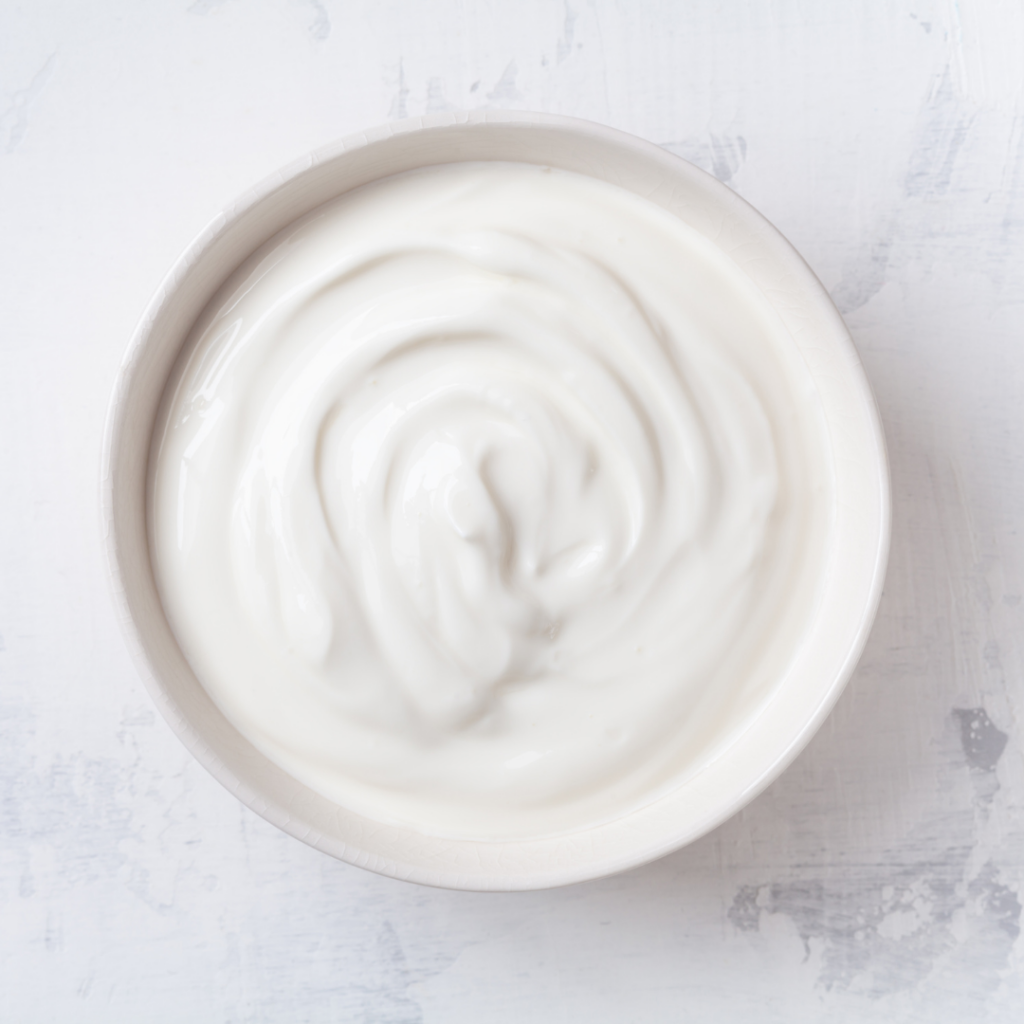
Vitamin A
This helps build up the protective cells that line your baby’s gut, breathing tube, eyes and so many other organs in the body (4). Vitamin A also helps some of these protective cells to secrete substances called antibodies that fight off infections.
Babies less than 12 months require 1333-1666 IU (400-500 mcg) of vitamin A per day. While babies over 12 months require about 1000-1333 IU (300 – 400 mcg) per day to prevent deficiency (5).
Vitamin A containing foods include (6):
- Beef liver, pan-fried (100 grams) – 25,800 IU (note that this is a very high amount and therefore we don’t recommend offering liver more than once per week)
- Sweet potato, baked in skin (100 grams) – 3203 IU
- Carrots, raw (100 grams) – 2783 IU
- Eggs, hard-boiled (100 grams) – 497 IU
- Red peppers, sweet, cooked (100 grams) – 490 IU
- Cheese, whole milk ricotta (100 grams) – 400 IU
- Cooked salmon (100 grams) – 230 IU
- Mangos, raw (100 grams) – 180 IU
Vitamin C
A powerful antioxidant that helps mop up harmful substances called free radicals from the body. It also increases the rate at which harmful bacteria is destroyed by your baby’s immune system (7).
Vitamin C helps keep your baby’s infection-fighting cells strong and also aids in the absorption of iron, which is another important nutrient for immunity.

However, the evidence on how well vitamin C supports the immune system is mixed. While some studies suggest that vitamin C possesses properties that can help prevent the flu, other studies report that the vitamin can only help in reducing the severity of the flu, but not prevent it (8). Either way, it’s an important vitamin to include regularly in your baby’s diet.
Babies less than 12 months require 400-500 mg per day, while babies over 12 months require about 15-25 mg per day (9).
Vitamin C containing foods include:
- Red pepper, sweet, cooked (100 grams) – 171 mg
- Kiwi, green, raw (100 grams) – 92.7 mg
- Green pepper, sweet, cooked (100 grams) – 74.4 mg
- Strawberry, raw (100 grams) – 58.8 mg
- Oranges (100 grams) – 53.2 mg
- Tangerine, raw (100 grams) – 26.7 mg
- Sweet potato, cooked, baked in skin (100 grams) – 12.8 mg
Vitamin D
Vitamin D is a nutrient that your baby needs to stay healthy. It helps white blood cells, called monocytes and macrophages, fight off harmful germs and reduces inflammation, which boosts your baby’s defenses (10).
Vitamin D also prevents a disease called rickets that can weaken your baby’s immune system.

A study from 2019 found that people who took vitamin D supplements had a lower risk of getting respiratory infections (11). This was true for both people who were low in vitamin D and those who already had enough.
Babies less than 12 months require 400 IU (10 mcg) per day, while babies over 12 months require about 600 IU (15 mcg) per day (12).
Vitamin D containing foods include:
- Cod liver oil (100 grams) – 10,000 IU
- Cheese, cheddar, sliced (100 grams) – 1640 IU
- Trout (rainbow), farmed, cooked (100 grams) – 760 IU
- Salmon (sockeye), cooked (100 grams) – 668 IU
- Eggs (100 grams) – 88 IU
- Milk, 3.25% milkfat, vitamin A and D fortified (100 grams) – 52 IU
- Liver, beef, braised (100 grams) – 48 IU
- Human breast milk – 4 IU
Important Note!
Breast milk is super nutritious, but it usually doesn’t have enough vitamin D for babies. That’s why your little one needs a vitamin D supplement if you’re breastfeeding. We also recommend vitamin D supplementation for combo-fed and exclusively formula-fed babies because not all formulas provide the same amount of vitamin D.
Your baby would have to drink a lot of formula to reach the daily recommended amount, and the upper tolerable intake level is so high that it would be difficult to give your baby too much vitamin D. Therefore, we recommend offering it regardless of how your baby feeds to ensure they’re getting enough.
We share some of our favorite vitamin D drops below!
Important Note!
Breast milk is super nutritious, but it usually doesn’t have enough vitamin D for babies. That’s why your little one needs a vitamin D supplement if you’re breastfeeding. We also recommend vitamin D supplementation for combo-fed and exclusively formula-fed babies because not all formulas provide the same amount of vitamin D.
Your baby would have to drink a lot of formula to reach the daily recommended amount, and the upper tolerable intake level is so high that it would be difficult to give your baby too much vitamin D. Therefore, we recommend offering it regardless of how your baby feeds to ensure they’re getting enough.
We share some of our favorite vitamin D drops below!
Vitamin E
Like vitamin A, this is a powerful antioxidant that helps get rid of harmful free radicals (13). It also has anti-inflammatory properties and can improve brain development in newborns.
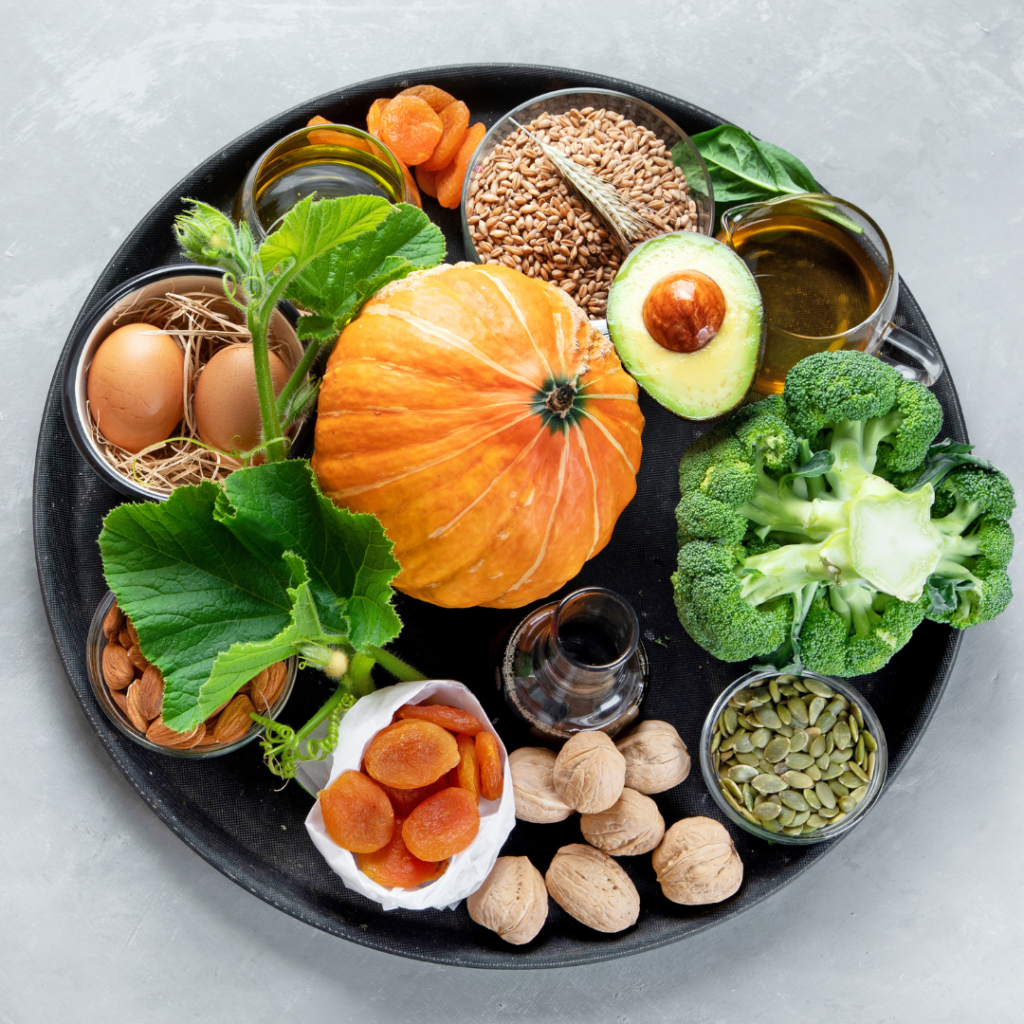
Babies less than 12 months require 4-5 mg per day, while babies over 12 months require about 6-15 mg per day (14).
Vitamin E containing foods include:
- Sunflower oil (100 grams) – 41.08 mg
- Sunflower seeds, dry roasted (100 grams) – 26.1 mg
- Almonds, dry roasted (100 grams) – 23.9 mg
- Hazelnuts, dry roasted (100 grams) – 15.3 mg
- Peanut butter (100 grams) – 9.11 mg
- Sweet potatoes, cooked, baked in skin (100 grams) – 0.71 mg
Iron
This is a critical nutrient for babies! Once they reach 6 months and are ready to start solids, your baby’s needs will increase making it important to offer multiple times per day (or even with every meal!).
Iron supports your baby’s immune system by boosting the development and maturation of white blood cells that help fight off infections (15, 16).

Even if they don’t have anemia (a condition caused by low iron), having low iron levels can still affect their immune system and how well they learn (17). So it’s important they get enough of it.
Babies less than 6 months require 0.27 mg per day, babies 7 to 12 months require about 11 mg per day, and over 12 months require 7 to 10 mg per day (18).
Iron containing foods include:
- Chicken liver, cooked, pan-fried (100 grams) – 12.9 mg
- Beef liver, pan fried (100 grams) – 6.12 mg
- Tofu, raw, prepared with calcium sulfate – 5.36 mg
- Lentils, boiled (100 grams) – 3.33 mg
- White beans, canned (100 grams) – 2.99 mg
- Canned, Atlantic sardines (100 grams) – 2.92 mg
- Kidney beans, canned (100 grams) – 2.08 mg
- Ground beef (100 grams) – 1.94 mg
- Turkey, dark meat (100 grams) – 1.43 mg
- Fresh salmon (100 grams) – 0.8 mg
Zinc
Zinc is really important in maintaining the normal function of immune cells (19). These immune cells fight off infections, keeping your baby’s immune system strong.
It also helps your baby’s immune cells develop, lowers inflammation, and protects their body’s barriers from harmful invaders.

Babies less than 12 months require 2-3 mg per day, while babies over 12 months require about 3-11 mg per day (20).
Zinc containing foods include:
- Oysters, Pacific, steamed (100 grams) – 78.26 mg
- Beef, bottom sirloin, roasted (100 grams) – 4.74 mg
- Cheese, cheddar, sliced (100 grams) – 3.74 mg
- Pork, center loin (chops), bone-in, broiled (100 grams) – 2.22 mg
- Turkey breast, meat only, roasted (100 grams) – 1.72 mg
- Lentils, boiled (100 grams) – 1.27 mg
- Greek yogurt, plain, low fat (100 grams) – 0.6 mg
To learn more about your baby’s unique nutritional needs and how to serve foods in all of these categories safely, check out our Baby Led Feeding online course and use our exclusive Texture Timeline™ Video Library!
The video library shows you how we recommend serving foods based on the phases of our Texture Timeline™. No matter what phase your baby is in, you’ll know how to offer food safely to them.
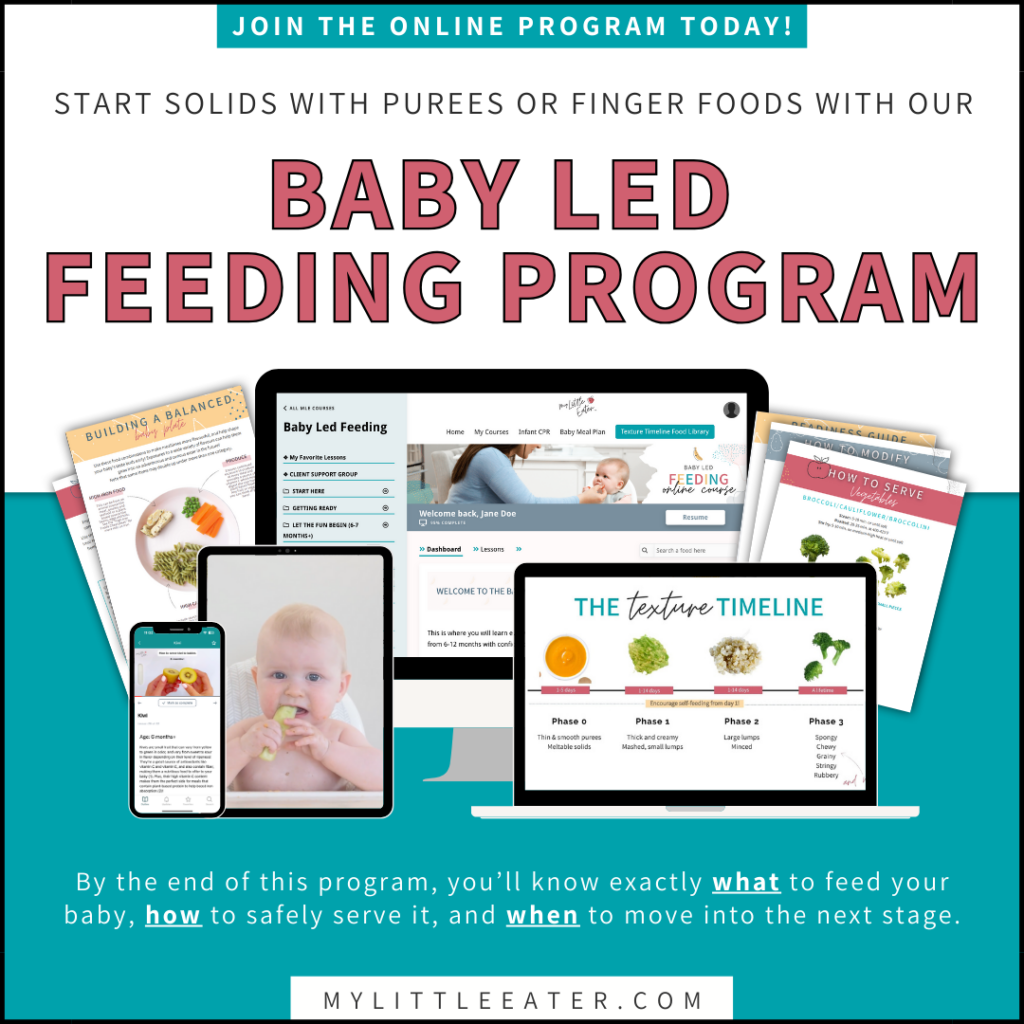
Extra nutrients for sick season
Now let’s dig into what you can do when the dreaded cold and flu season is approaching and you want to give your baby an extra boost to get through this time (with as few illnesses as possible!).
Elderberry
Elderberry is a nutritious fruit, usually taken as a supplement. It’s packed with vitamin C and antioxidants, which can give your baby’s immunity an extra boost when feeling under the weather. One study noted elderberry to contain properties that can relieve respiratory symptoms like the flu (21).
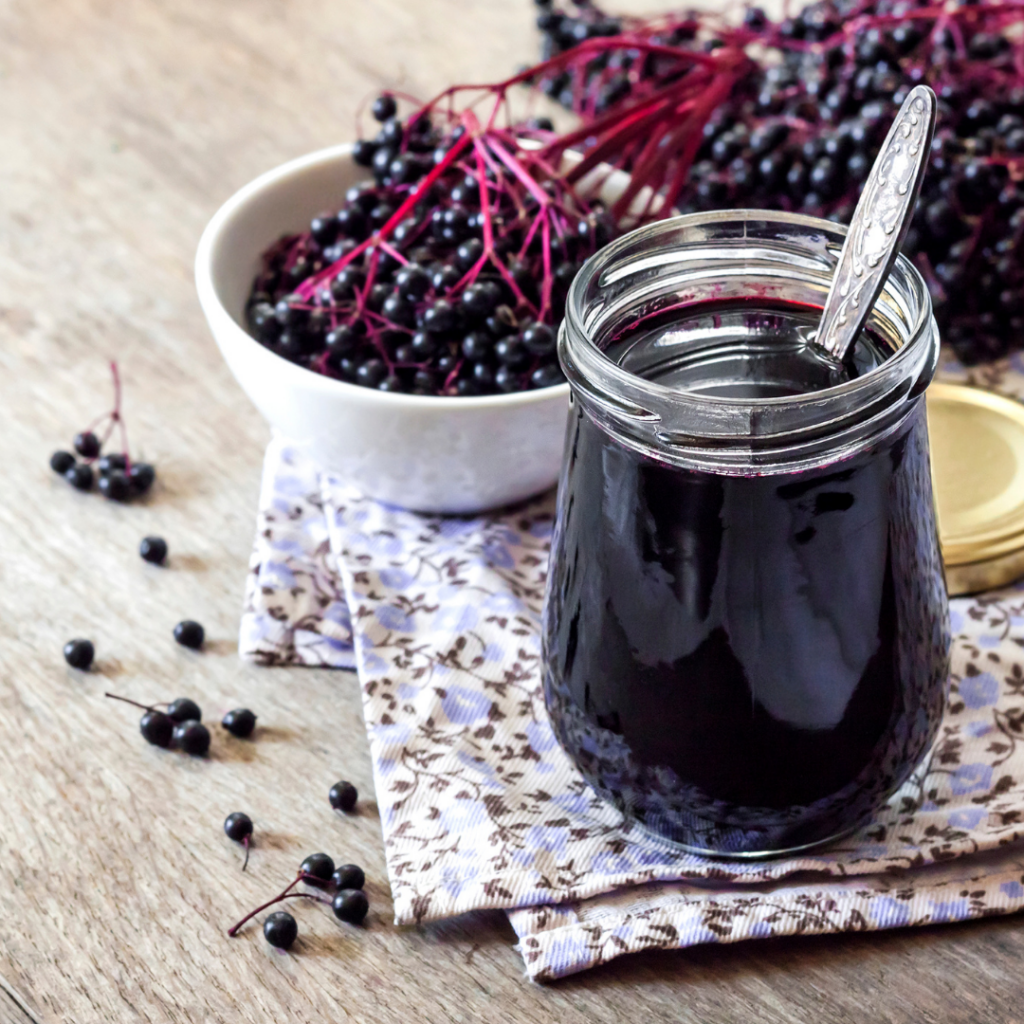
While there haven’t been studies specifically on children, things look promising for elderberry. However, more research is needed in order to confirm this. For example, there currently isn’t enough research to determine a safe medicinal dose. Therefore, we can’t say for sure what a safe amount is to consume and what isn’t.
If you choose to give it a try, it’s best to take elderberry within 24 hours of the start of a cold or flu. You can find our favorite elderberry supplements in our Amazon shop.
Please note: Most elderberry products state that they are not safe for children under 2-4 years old. Always read labels carefully and consult your doctor before giving elderberry to your baby.
Garlic
Garlic has several medicinal properties, one of which is beneficial in boosting your baby’s immunity. Whether taken cooked or as a supplement, studies have shown that garlic possesses some compounds, minerals, and vitamins that can boost immunity and prevent infections (22).

One clove of garlic provides your baby with about 1% daily zinc and 2% of their daily vitamin C requirement, depending on your child’s age (23, 24, 9).
We suggest one to two cloves of garlic per day to help boost their immune system during sick season.
Peanut butter
A favorite for many kids, peanut butter is not only delicious but also packed with nutrients. It’s rich in antioxidants, protein, zinc, and vitamin E, which help with muscle repair, boosting immunity, and keeping your baby’s metabolism running smoothly (25).
Just one serving (45 grams) of peanut butter provides your little one with about 30% of the daily zinc requirements for babies under two, and about 11% in older kids (26, 20).
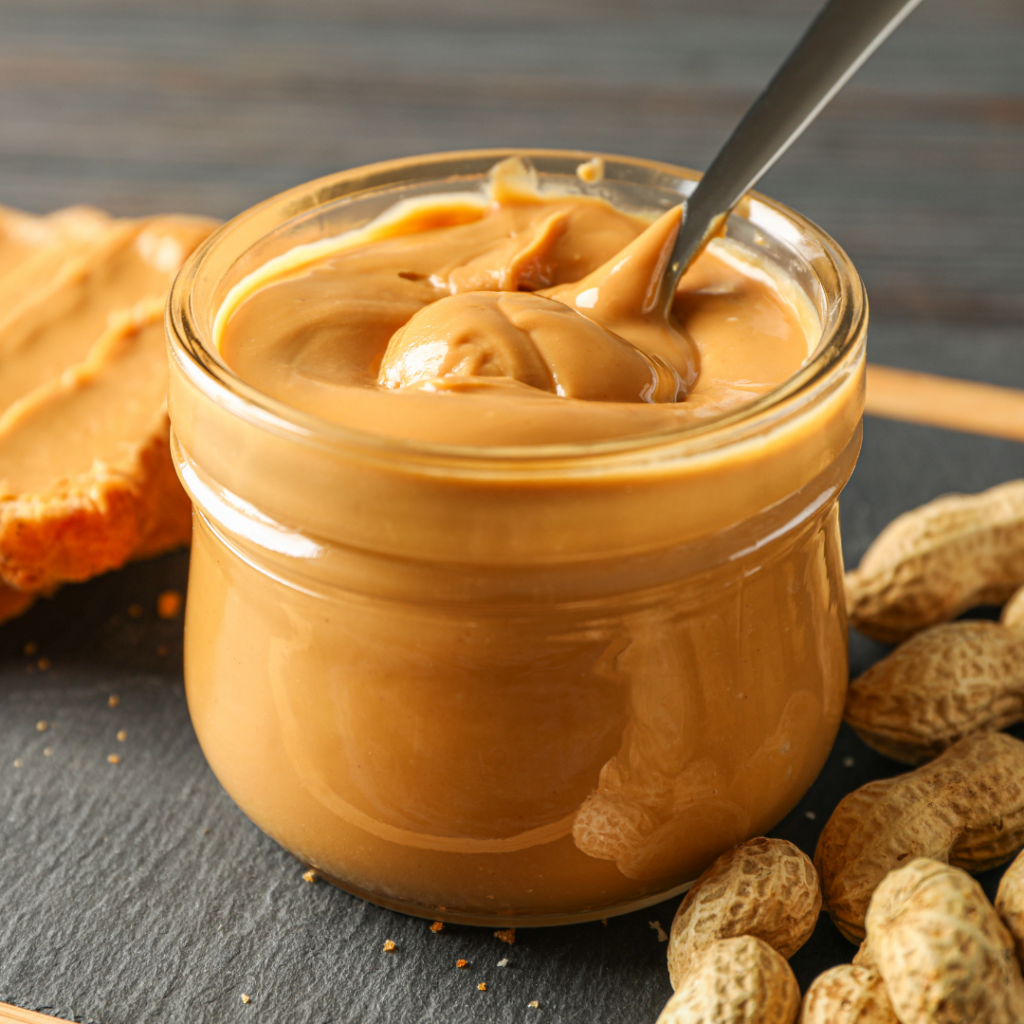
We recommend opting for an all-natural peanut butter to avoid the added salt, sugar, and preservatives often found in other varieties. Aim for one that has as few ingredients as possible, just peanuts, oil, and maybe a bit of salt.
Eggs
Eggs are a budget-friendly way to get vitamin D and zinc, two nutrients that help keep your baby’s immune system strong (27).
One large egg provides your little one with around 8% of their daily vitamin D and 7% of their daily zinc requirements (12, 20).
Studies show that zinc can help shorten the length and intensity of a common cold (28). While eggs don’t have as much zinc as supplements, they can still give a small boost to your child’s recovery.

Strawberries
Just one large strawberry gives your little one over 25% of their daily vitamin C needs (9)! Vitamin C is great for your baby’s immune system and can help speed up recovery from respiratory infections (29).
But that’s not all – strawberries are also packed with potassium, folate, fiber, and powerful antioxidants like polyphenols and flavonoids. These nutrients are known to help fight off diseases. In fact, studies have shown that the flavonoids in strawberries can reduce the risk of upper respiratory infections (30).

Supplements for boosting baby's immune system
While we recommend providing as much of the vitamins and minerals mentioned in this blog through food, we know that’s not always possible.
If you find there are certain nutrients that your baby is missing out on due to food allergies, food refusals, or because the foods are not accessible to you, offering supplements can help their immune system as well.

Disclaimer
Always consult with your child’s doctor before starting any new vitamins or supplements to confirm they are actually required and to get their proper dosage information.
Babies and toddlers can consume too much of any vitamin or mineral, and in some cases, this can have negative effects. So it’s important to avoid offering them in excess and stay within recommended limits.
Disclaimer
Always consult with your child’s doctor before starting any new vitamins or supplements to confirm they are actually required and to get their proper dosage information.
Babies and toddlers can consume too much of any vitamin or mineral, and in some cases, this can have negative effects. So it’s important to avoid offering them in excess and stay within recommended limits.
Vitamin D
Looking to add a boost of vitamin D to your little one’s daily intake? We’ve got you covered! In fact, we recommend that babies and toddlers (and even adults) take a vitamin D supplement year-round because it’s very rare for anyone to be getting as much vitamin D as they need.
Learn more about vitamin D and why we recommend continued supplementation.
Here is a list of our favorite vitamin D supplements for your little one:
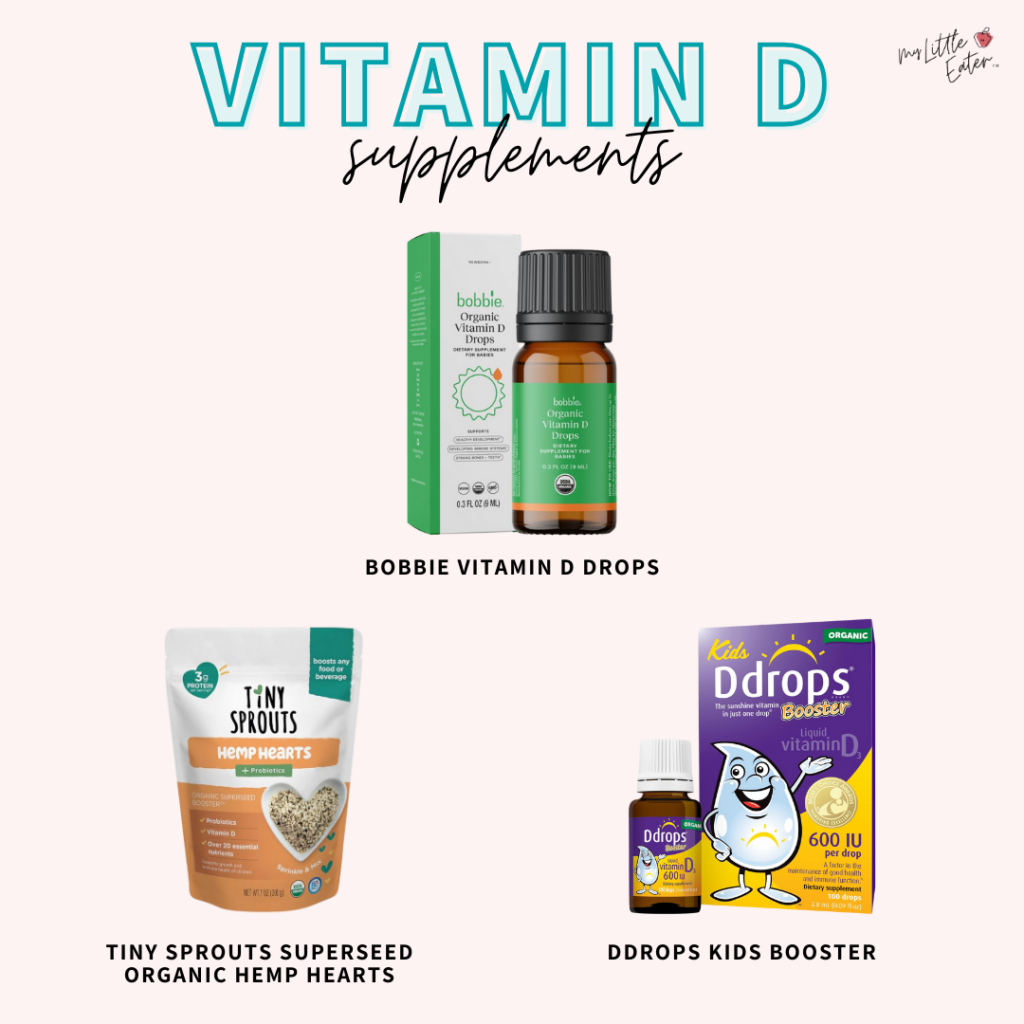
Iron
You can find iron in lots of foods like meat, fish, vegetables, and nuts. Many breakfast cereals even have extra iron added to them. But sometimes, even with these foods, kids don’t get enough iron. In fact, iron is the number one nutrient deficiency in children worldwide. So if your child struggles with this too, you certainly aren’t alone!
NOTE: Iron supplements always need to be discussed with your doctor before offering to ensure they are needed and the correct dosage is being provided.
They can have negative side effects and therefore they are not recommended unless absolutely necessary and this is something only your healthcare provider who is familiar with your child and their health can tell you.
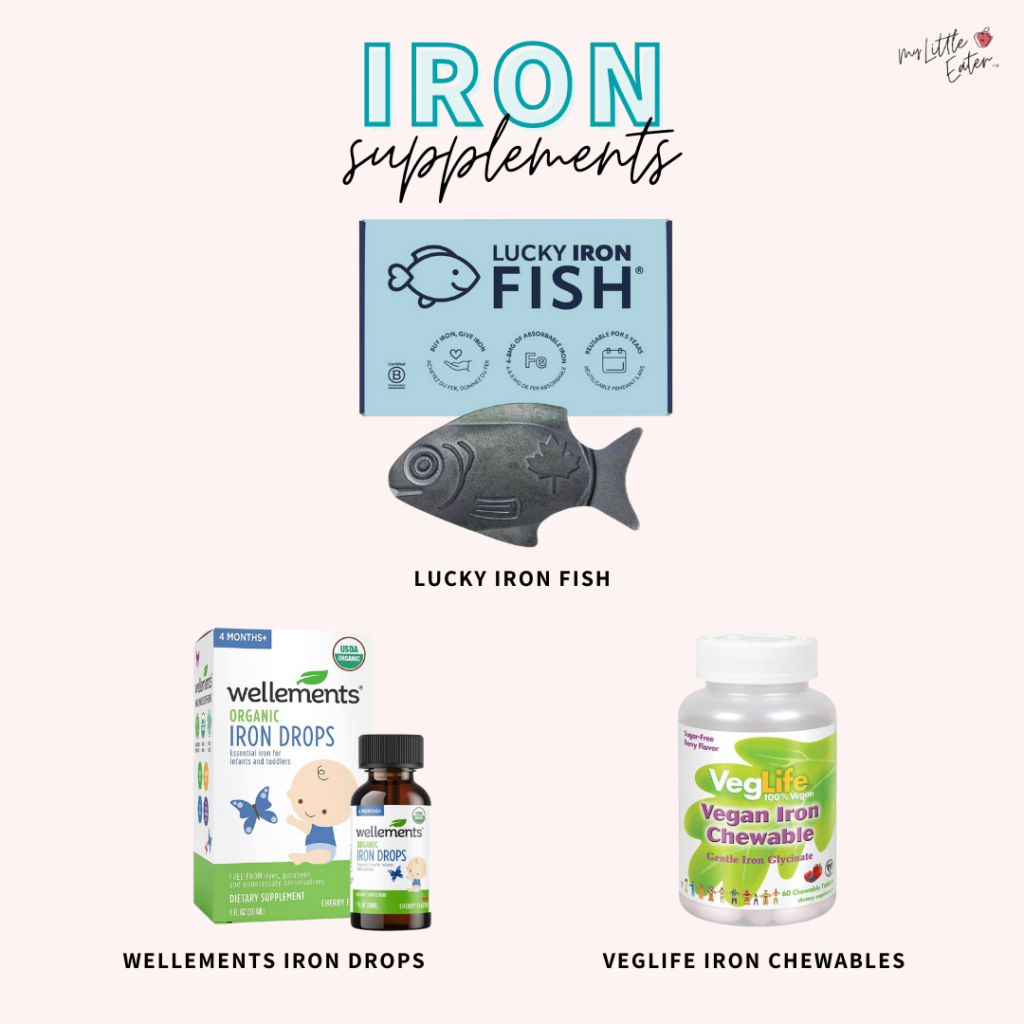
For an iron boost, here are some supplements we suggest you try:
As your baby grows, there may be other nutrients of concern based on their diet, if they’re a picky eater, etc. If you find this to be the case, always consult your child’s doctor before beginning any supplement to ensure it’s necessary and the dose is correct.
Other factors that affect your baby’s immunity
Now that you understand how your baby’s nutrition impacts their immunity, and have specific ideas on what you can do to help them in that area, let’s go over some other factors that could be impacting their immune system as well.
Some of these you aren’t going to be able to control, but it’s important to be aware of them so that if you have concerns you can bring them up with your baby’s doctor.

Sleep
Adequate sleep plays a vital role in bolstering your baby’s immune system. During sleep, the body produces chemicals that regulate immune responses. These chemicals help fend off infections and support your baby’s ability to fight off illnesses (32).
Research shows that children who get sufficient sleep are less susceptible to common infections such as colds, flu, and respiratory illnesses (33). Quality sleep helps maintain the body’s defense mechanisms, reducing the risk of falling ill and promoting overall health and wellness.
Babies less than 12 months might still nap several times a day. Every baby is different—some nap for just 20 minutes, while others snooze for hours! Toddlers and preschoolers usually sleep for about 11 to 14 hours total in a day. And by age 3, they might only need one nap (34).
All that to say, we know sleep is a very sensitive topic for parents and you need to do what works best for your family with regards to sleep training, not sleep training, etc. We just want you to be aware of the impact that sleep deprivation can have on other aspects of their health – and yours for that matter!
No matter what you choose to do, we know getting enough sleep with babies is hard. It’s only temporary and there are other factors you can focus on for boosting their immune system. If this is something you’re struggling with right now, you’re certainly not alone in that.
If you think that you and your baby would benefit from some tips from a sleep expert, we love Little Z’s Sleep!
Genetics
Your baby’s immune system is influenced by genetic factors inherited from both parents. Genes play a crucial role in determining the effectiveness of your baby’s immune responses, including how their bodies recognize and fight off harmful germs (35).
Pre-existing conditions
There are certain medical conditions that can impact your baby’s immune system and make it more difficult for them to fight off an illness – even if they’re getting all the nutrients they should. If your baby has one of these conditions, this is likely something that you would have spoken to their medical team about to make a plan for increasing their protection.
A few examples of illnesses that can impact your baby’s immune system are: Down syndrome, sickle cell disease, and some genetic conditions such as primary immunodeficiency disorders where your baby is born with a weak immune system (36, 37).
Hygiene
One of the most effective ways to support your baby’s immune system is through proper hygiene practices.
Here are some tips to follow for maintaining good hygiene around babies:
- Proper hand washing before touching or feeding your baby
- Regularly clean and disinfect commonly touched surfaces, such as countertops, doorknobs, and toys
- Practice good diapering hygiene
- Establish a regular bathing routine for your baby to keep their skin clean and healthy
- No kissing the baby – This is something that has really taken off recently on social media and is very important for babies, particularly newborns, preemies, and those with compromised immune systems (but really it’s just good practice for all babies!). Adults (even other family members) can carry viruses without any symptoms (thanks to a well-developed immune system) and can transmit that virus to a baby resulting in severe symptoms for them (38). Have a rule that you don’t allow kisses to your baby on their head/face, hands, or feet (basically anywhere they can easily put into their mouth).
Vaccination status
Vaccination plays a very important role in strengthening your baby’s immunity and protecting them from various diseases. Vaccination serves as a primer for your baby’s immune system, introducing harmless versions of disease-causing germs or bacteria.
This exposure stimulates the immune response, allowing your baby’s body to recognize and combat these pathogens more effectively in the future. By mimicking the natural infection process, vaccines prepare the immune system to respond swiftly and effectively when encountering the actual bacteria or virus.
If your baby isn’t adequately vaccinated, they may easily contract preventable diseases that could further depress their immune system. Following the recommended vaccine schedule is essential for ensuring your baby receives timely protection against vaccine-preventable diseases by strengthening their immune system (39).
As with everything we do, we’re here to provide the most up-to-date research so that you can make an informed decision for your family. We are NOT here to judge what you choose to do about vaccines as we know this is a sensitive topic for many. We provide the information, you decide what works best for your family, and we’ll support you either way knowing that each family is unique and these decisions are solely yours to make.
That is all of our tips for boosting immunity to survive cold and flu season! Remember, every baby is unique, and what works for one may not work for another. Trust your instincts, do all you can, and don’t hesitate to seek guidance from healthcare professionals. Wishing you a year filled with as few colds, ear infections, and stomach bugs as possible!
If you’re looking for simple, baby-friendly recipes that provide your little one with the nutrition they need, introduce allergens strategically, and gradually increase in texture difficulty – check out our 60 Day Baby Led Feeding Meal Plan!
With over 60 recipes and 115+ new foods introduced in just 9 weeks – this is exactly what you need to boost your baby’s nutrition and offer enough variety to help prevent picky eating down the road.
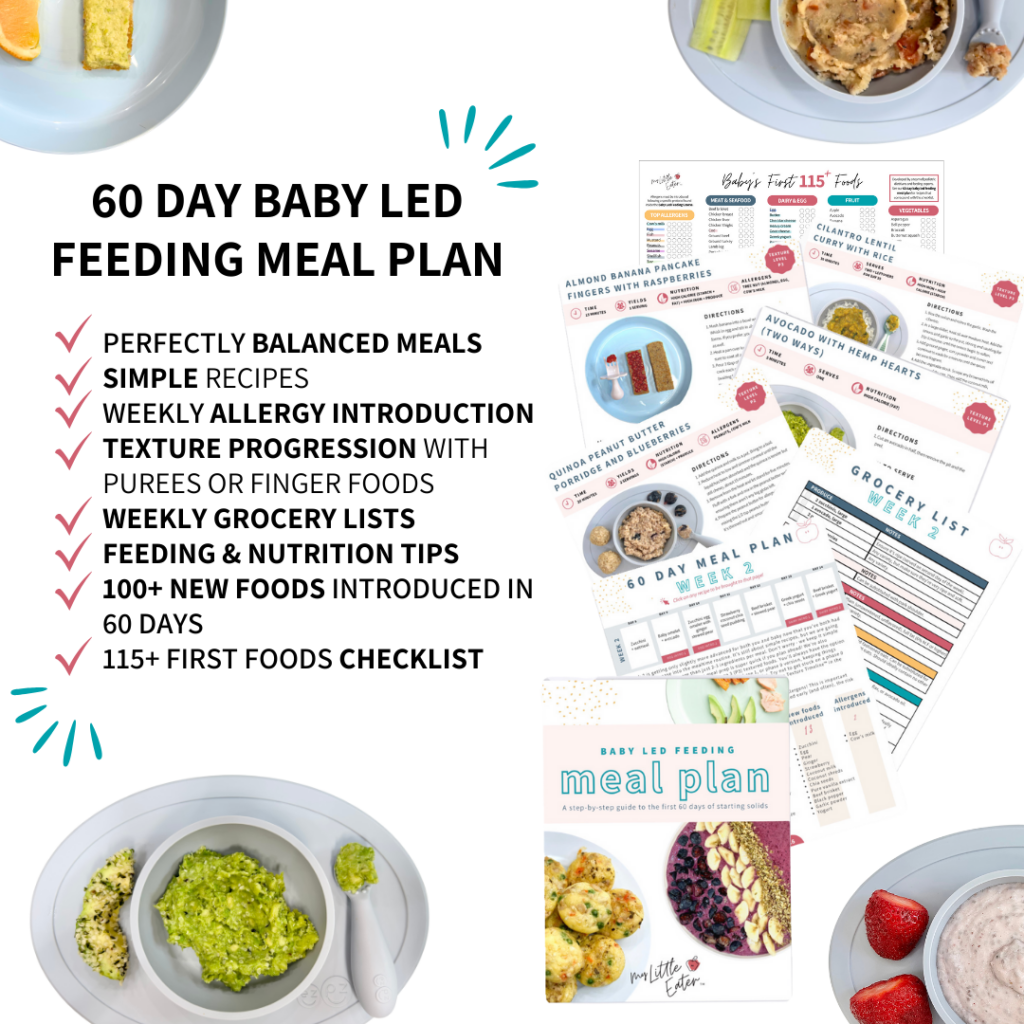
Simple recipe to boost baby immune systems
Below is a recipe to get you started on providing well-rounded meals for your baby. It contains liver which is high in vitamin A, zinc, vitamin B12, and iron – making it great for boosting your baby’s immunity and providing essential nutrition they need to thrive.
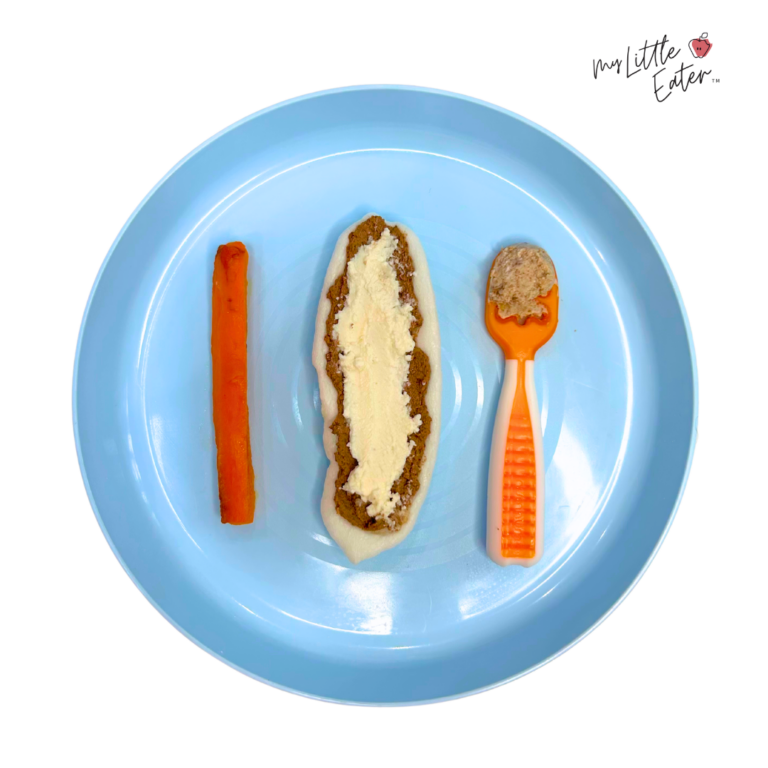
Liver pâté & goat cheese on rice rusks
Equipment
- 1 medium skillet
Ingredients
- 2 tbsp coconut oil (divided)
- 1 yellow onion
- 2-3 cloves garlic
- 4 oz organic chicken liver (113 g)
- 2 tsp thyme
- ¼ cup water
- 4-6 rice rusks (or 2 slices toast)
- 2 tbsp goat cheese
Instructions
- Dice the onion and mince the garlic. Slice the liver into strips, about 1 inch thick.
- Heat half of the coconut oil in a skillet over medium heat. Add the garlic and onion and sautée until fragrant (about 3-4 minutes).
- Add the liver, thyme, and water to the pan, then cover and cook for six to eight minutes, or until the liver turns light brown.
- Turn off the heat and let rest for five minutes, covered. Drain the excess liquid.
- Add the liver mixture and the remaining coconut oil to a food processor. Blend until smooth, adding more coconut oil if needed.
- Spread a thin layer of liver pâté onto the rice rusks. Top with a thin layer of goat cheese spread on top of each rice rusk.
Notes
Pin this to save it for sick season!
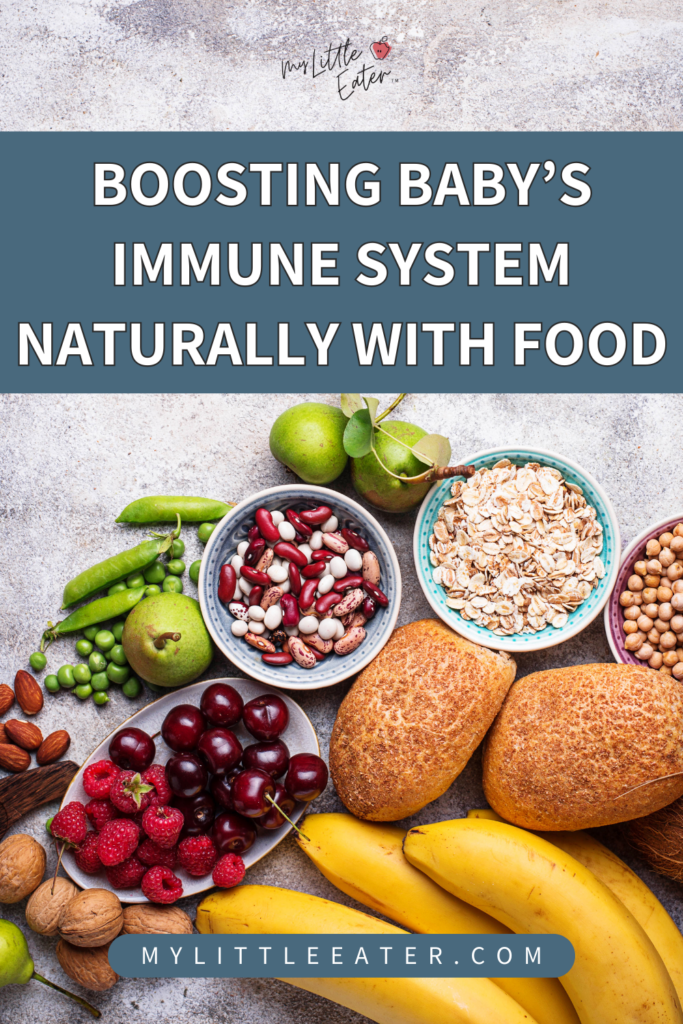
References
- Kloc M, Ghobrial RM, Kuchar E, Lewicki S, Kubiak JZ. Development of child immunity in the context of COVID-19 pandemic. Clin Immunol. 2020 Aug;217:108510. doi: 10.1016/j.clim.2020.108510. Epub 2020 Jun 13. PMID: 32544611; PMCID: PMC7293525.
- https://www.cdc.gov/nutrition/infantandtoddlernutrition/breastfeeding/recommendations-benefits.html#:~:text=Espa%C3%B1ol-,Breastfeeding,years%20of%20age%20or%20longer.
- Verduci E, Köglmeier J. Immunomodulation in Children: The Role of the Diet. J Pediatr Gastroenterol Nutr. 2021 Sep 1;73(3):293-298. doi: 10.1097/MPG.0000000000003152. PMID: 33872290; PMCID: PMC9770123.
- Shaikh Meshbahuddin Ahmad, Rubhana Raqib, Firdausi Qadri, Charles B. Stephensen, The effect of newborn vitamin A supplementation on infant immune functions: Trial design, interventions, and baseline data, Contemporary Clinical Trials, Volume 39, Issue 2, 2014, Pages 269-279, ISSN 1551-7144, https://doi.org/10.1016/j.cct.2014.09.004.
- https://ods.od.nih.gov/factsheets/VitaminA-HealthProfessional/
- https://fdc.nal.usda.gov/index.html
- Traber MG, Stevens JF. Vitamins C and E: beneficial effects from a mechanistic perspective. Free Radic Biol Med. 2011 Sep 1;51(5):1000-13. doi: 10.1016/j.freeradbiomed.2011.05.017. Epub 2011 May 25. PMID: 21664268; PMCID: PMC3156342.
- https://www.healthline.com/nutrition/does-vitamin-c-help-with-colds
- https://ods.od.nih.gov/factsheets/VitaminC-HealthProfessional/
- Mailhot G, White JH. Vitamin D and Immunity in Infants and Children. Nutrients. 2020 Apr 27;12(5):1233. doi: 10.3390/nu12051233. PMID: 32349265; PMCID: PMC7282029.
- Martineau AR, Jolliffe DA, Greenberg L, Aloia JF, Bergman P, Dubnov-Raz G, Esposito S, Ganmaa D, Ginde AA, Goodall EC, Grant CC, Janssens W, Jensen ME, Kerley CP, Laaksi I, Manaseki-Holland S, Mauger D, Murdoch DR, Neale R, Rees JR, Simpson S, Stelmach I, Trilok Kumar G, Urashima M, Camargo CA, Griffiths CJ, Hooper RL. Vitamin D supplementation to prevent acute respiratory infections: individual participant data meta-analysis. Health Technol Assess. 2019 Jan;23(2):1-44. doi: 10.3310/hta23020. PMID: 30675873; PMCID: PMC6369419.
- https://ods.od.nih.gov/factsheets/VitaminD-HealthProfessional/
- Kolnik S, Wood TR. Role of Vitamin E in Neonatal Neuroprotection: A Comprehensive Narrative Review. Life (Basel). 2022 Jul 20;12(7):1083. doi: 10.3390/life12071083. PMID: 35888171; PMCID: PMC9316652.
- https://ods.od.nih.gov/factsheets/Vitamine-HealthProfessional/#:~:text=Naturally%20occurring%20vitamin%20E%20exists,recognized%20to%20meet%20human%20requirements.
- Soyano A, Gómez M. Participación del hierro en la inmunidad y su relación con las infecciones [Role of iron in immunity and its relation with infections]. Arch Latinoam Nutr. 1999 Sep;49(3 Suppl 2):40S-46S. Spanish. PMID: 10971835.
- https://ufhealth.org/news/2023/uf-researchers-discover-iron-plays-key-role-in-immune-system-health#:~:text=Most%20people%20know%20that%20iron,system%2C%20especially%20in%20the%20intestine.
- Gutema BT, Sorrie MB, Megersa ND, Yesera GE, Yeshitila YG, Pauwels NS, De Henauw S, Abbeddou S. Effects of iron supplementation on cognitive development in school-age children: Systematic review and meta-analysis. PLoS One. 2023 Jun 27;18(6):e0287703. doi: 10.1371/journal.pone.0287703. PMID: 37368919; PMCID: PMC10298800.
- https://ods.od.nih.gov/factsheets/iron-healthprofessional/#:~:text=Iron%20is%20a%20mineral%20that,to%20the%20tissues%20%5B1%5D.
- Prasad AS. Zinc in human health: effect of zinc on immune cells. Mol Med. 2008 May-Jun;14(5-6):353-7. doi: 10.2119/2008-00033.Prasad. PMID: 18385818; PMCID: PMC2277319.
- https://ods.od.nih.gov/factsheets/Zinc-HealthProfessional/
- Jessie Hawkins, Colby Baker, Lindsey Cherry, Elizabeth Dunne, Black elderberry (Sambucus nigra) supplementation effectively treats upper respiratory symptoms: A meta-analysis of randomized, controlled clinical trials, Complementary Therapies in Medicine, Volume 42, 2019, Pages 361-365, ISSN 0965-2299, https://doi.org/10.1016/j.ctim.2018.12.004.
- Percival SS. Aged Garlic Extract Modifies Human Immunity. J Nutr. 2016 Feb;146(2):433S-436S. doi: 10.3945/jn.115.210427. Epub 2016 Jan 13. PMID: 26764332.
- https://fdc.nal.usda.gov/fdc-app.html#/food-details/169230/nutrients
- https://www.mayoclinic.org/drugs-supplements/zinc-supplement-oral-route-parenteral-route/proper-use/drg-20070269
- https://fdc.nal.usda.gov/fdc-app.html#/food-details/1100559/nutrients
- https://www.cdc.gov/nutrition/infantandtoddlernutrition/vitamins-minerals/zinc.html
- https://fdc.nal.usda.gov/fdc-app.html#/food-details/171287/nutrients
- Hunter J, Arentz S, Goldenberg J, Yang G, Beardsley J, Myers SP, Mertz D, Leeder S. Zinc for the prevention or treatment of acute viral respiratory tract infections in adults: a rapid systematic review and meta-analysis of randomised controlled trials. BMJ Open. 2021 Nov 2;11(11):e047474. doi: 10.1136/bmjopen-2020-047474. PMID: 34728441; PMCID: PMC8578211.
- Carr AC, Maggini S. Vitamin C and Immune Function. Nutrients. 2017 Nov 3;9(11):1211. doi: 10.3390/nu9111211. PMID: 29099763; PMCID: PMC5707683.
- Somerville VS, Braakhuis AJ, Hopkins WG. Effect of Flavonoids on Upper Respiratory Tract Infections and Immune Function: A Systematic Review and Meta-Analysis. Adv Nutr. 2016 May 16;7(3):488-97. doi: 10.3945/an.115.010538. PMID: 27184276; PMCID: PMC4863266.
- Nault D, Machingo TA, Shipper AG, Antiporta DA, Hamel C, Nourouzpour S, Konstantinidis M, Phillips E, Lipski EA, Wieland LS. Zinc for prevention and treatment of the common cold. Cochrane Database Syst Rev. 2024 May 9;5(5):CD014914. doi: 10.1002/14651858.CD014914.pub2. PMID: 38719213; PMCID: PMC11078591.
- Besedovsky L, Lange T, Haack M. The Sleep-Immune Crosstalk in Health and Disease. Physiol Rev. 2019 Jul 1;99(3):1325-1380. doi: 10.1152/physrev.00010.2018. PMID: 30920354; PMCID: PMC6689741.
- Radmanish M, Khalfallah O, Glaichenhaus N, Forhan A, Heude B, Charles MA, Davidovic L, Plancoulaine S. Sleep duration trajectories associated with levels of specific serum cytokines at age 5: A longitudinal study in preschoolers from the EDEN birth cohort. Brain Behav Immun Health. 2022 Feb 8;21:100429. doi: 10.1016/j.bbih.2022.100429. PMID: 35243407; PMCID: PMC8881417.
- https://caringforkids.cps.ca/handouts/pregnancy-and-babies/healthy_sleep_for_your_baby_and_child#:~:text=Infants%20(4%20to%2012%20months),morning%2C%20afternoon%20and%20early%20evening.
- Oyesola OO, Souza COS, Loke P. The Influence of Genetic and Environmental Factors and Their Interactions on Immune Response to Helminth Infections. Front Immunol. 2022 Apr 29;13:869163. doi: 10.3389/fimmu.2022.869163. PMID: 35572520; PMCID: PMC9103684.
- Huggard D, Doherty DG, Molloy EJ. Immune Dysregulation in Children With Down Syndrome. Front Pediatr. 2020 Feb 27;8:73. doi: 10.3389/fped.2020.00073. PMID: 32175298; PMCID: PMC7056667.
- https://cps.ca/en/documents/position/acute-complications-with-sickle-cell
- https://www.healthline.com/health-news/how-careful-should-parents-be-letting-people-kiss-newborn%23Advice-for-parents
- https://www.cdc.gov/vaccines/schedules/easy-to-read/child-easyread.html

Edwena Kennedy, RD
Founder and lead Registered Pediatric Dietitian at My Little Eater Inc., creator of The Texture Timeline™, and mom of two picky-turned-adventurous eaters.

Edwena Kennedy, RD
Founder and lead Registered Pediatric Dietitian at My Little Eater Inc., creator of The Texture Timeline™, and mom of two picky-turned-adventurous eaters.
